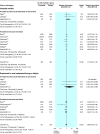Meta-analysis of frusemide to prevent or treat acute renal failure
- PMID: 16861256
- PMCID: PMC1553510
- DOI: 10.1136/bmj.38902.605347.7C
Meta-analysis of frusemide to prevent or treat acute renal failure
Abstract
Objective: To investigate the potential beneficial and adverse effects of frusemide to prevent or treat acute renal failure in adults.
Design: Meta-analysis of randomised controlled trials.
Data sources: Cochrane controlled trials register (2005 issue 4), Embase, and Medline (1966 to 1 February 2006), without language restrictions.
Review methods: Two reviewers checked the quality of the studies and independently extracted data.
Results: Nine randomised controlled trials totalling 849 patients with or at risk of acute renal failure were included. Outcome measures not significantly different after frusemide treatment were in-hospital mortality (relative risk 1.11, 95% confidence interval 0.92 to 1.33), risk for requiring renal replacement therapy or dialysis (0.99, 0.80 to 1.22), number of dialysis sessions required (weight mean difference--0.48 sessions, -1.45 to 0.50), and proportion of patients with persistent oliguria (urine output < 500 ml/day: 0.54, 0.18 to 1.61). Stratifying studies that used frusemide to prevent or treat acute renal failure did not change the results on mortality (relative risk ratio 2.10, 95% confidence interval 0.67 to 6.63) and the risk for requiring dialysis (4.12, 0.46 to 37.2). Evidence suggested an increased risk of temporary deafness and tinnitus in patients treated with high doses of frusemide (relative risk 3.97, 95% confidence interval 1.00 to 15.78).
Conclusions: Frusemide is not associated with any significant clinical benefits in the prevention and treatment of acute renal failure in adults. High doses may be associated with an increased risk of ototoxicity.
Figures





Comment in
-
Early intervention in acute renal failure.BMJ. 2006 Aug 26;333(7565):406-7. doi: 10.1136/bmj.38945.596215.80. BMJ. 2006. PMID: 16931827 Free PMC article. No abstract available.
Similar articles
-
High dose frusemide in acute reversible intrinsic renal failure. A preliminary communication.Scott Med J. 1974;19 Suppl 1:35-9. doi: 10.1177/00369330740190S108. Scott Med J. 1974. PMID: 4614439 Clinical Trial. No abstract available.
-
High dose frusemide in established acute renal failure.Br Med J. 1973 Nov 24;4(5890):449-50. doi: 10.1136/bmj.4.5890.449. Br Med J. 1973. PMID: 4758446 Free PMC article. Clinical Trial.
-
Intermittent furosemide administration in patients with or at risk for acute kidney injury: Meta-analysis of randomized trials.PLoS One. 2018 Apr 24;13(4):e0196088. doi: 10.1371/journal.pone.0196088. eCollection 2018. PLoS One. 2018. PMID: 29689116 Free PMC article. Clinical Trial.
-
Effect of theophylline on prevention of contrast-induced acute kidney injury: a meta-analysis of randomized controlled trials.Am J Kidney Dis. 2012 Sep;60(3):360-70. doi: 10.1053/j.ajkd.2012.02.332. Epub 2012 Apr 17. Am J Kidney Dis. 2012. PMID: 22516682 Review.
-
Effects of post-operative furosemide in adult surgical patients: A systematic review and meta-analysis of randomised clinical trials.Acta Anaesthesiol Scand. 2020 Mar;64(3):282-291. doi: 10.1111/aas.13513. Epub 2019 Dec 17. Acta Anaesthesiol Scand. 2020. PMID: 31742656
Cited by
-
Acute renal failure.BMJ. 2006 Oct 14;333(7572):786-90. doi: 10.1136/bmj.38975.657639.AE. BMJ. 2006. PMID: 17038736 Free PMC article. Review. No abstract available.
-
Fluid Overload Is Associated With Late Poor Outcomes in Neonates Following Cardiac Surgery.Pediatr Crit Care Med. 2016 May;17(5):420-7. doi: 10.1097/PCC.0000000000000715. Pediatr Crit Care Med. 2016. PMID: 27028790 Free PMC article.
-
Fluid balance, diuretic use, and mortality in acute kidney injury.Clin J Am Soc Nephrol. 2011 May;6(5):966-73. doi: 10.2215/CJN.08781010. Epub 2011 Mar 10. Clin J Am Soc Nephrol. 2011. PMID: 21393482 Free PMC article.
-
Nebulised dornase alfa versus placebo or hypertonic saline in adult critically ill patients: a systematic review of randomised clinical trials with meta-analysis and trial sequential analysis.Syst Rev. 2015 Nov 8;4:153. doi: 10.1186/s13643-015-0142-z. Syst Rev. 2015. PMID: 26547839 Free PMC article.
-
Care of the critically ill emergency department patient with acute kidney injury.Emerg Med Int. 2012;2012:760623. doi: 10.1155/2012/760623. Epub 2011 Nov 24. Emerg Med Int. 2012. PMID: 22145079 Free PMC article.
References
-
- Uchino S, Kellum JA, Bellomo R, Doig GS, Morimatsu H, Morgera S, et al. Acute renal failure in critically ill patients: a multinational, multicenter study. JAMA 2005;294: 813-8. - PubMed
-
- Uchino S, Doig GS, Bellomo R, Morimatsu H, Morgera S, Schetz M, et al. Diuretics and mortality in acute renal failure. Crit Care Med 2004;32: 1669-77. - PubMed
-
- Brezis M, Agmon Y, Epstein FH. Determinants of intrarenal oxygenation. I. Effects of diuretics. Am J Physiol 1994;267(6 Pt 2): F1059-62. - PubMed
-
- Heyman SN, Rosen S, Epstein FH, Spokes K, Brezis ML. Loop diuretics reduce hypoxic damage to proximal tubules of the isolated perfused rat kidney. Kidney Int 1994;45: 981-5. - PubMed
-
- Frankel MC, Weinstein AM, Stenzel KH. Prognostic patterns in acute renal failure: the New York Hospital, 1981-1982. Clin Exp Dial Apheresis 1983;7: 145-67. - PubMed
Publication types
MeSH terms
Substances
LinkOut - more resources
Full Text Sources
Other Literature Sources
